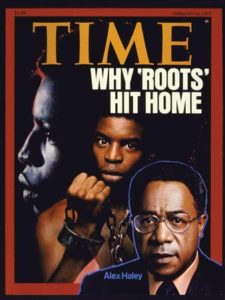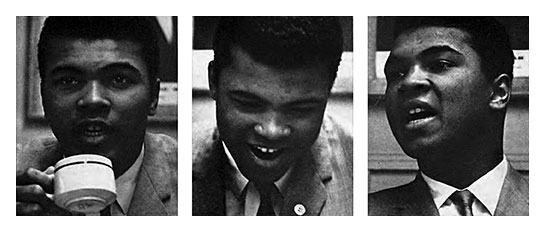Interviews in History: Alex Haley
Playboy has published many of the greatest celebrity interviews of all time since September 1962, starting with an interview by Alex Haley with jazz legend Miles Davis. Having set the stage for generations to come, Haley became one of the best interviewers in history.

Alex Haley (right) on the cover of Time magazine (February 4, 1977)
I highly recommend Haley's tense interview with the infamous George Lincoln Rockwell, founder of the American Nazi Party, one year before Rockwell's murder.
Excerpt: George Lincoln Rockwell (April 1966)
HALEY: Before we begin, Commander, I wonder if you'd mind telling me why you're keeping that pistol there at your elbow, and this armed bodyguard between us.
ROCKWELL: Just a precaution. You may not be aware of the fact that I have received literally thousands of threats against my life. Most of them are from cranks, but some of them haven't been; there are bullet holes all over the outside of this building. Just last week, two gallon jugs of flaming gasoline were flung against the house right under my window. I keep this gun within reach and a guard beside me during interviews because I've been attacked too many times to take any chances.
I haven't been jumped by an impostor, but it wasn't long ago that 17 guys claiming to be from the university came here to "interview" me; nothing untoward happened, but we later found out they were armed and planned to tear down the flag, burn the joint and beat me up. Only the fact that we were ready for that kind of rough stuff kept it from happening. We've never yet had to hurt anybody, but only because I think they all know we're ready to fight any time. If you're who you claim to be, you have nothing to fear.
HALEY: I don't.
ROCKWELL: Good. Just so we both know where we stand, I'd like to make something else crystal clear before we begin. I'm going to be honest and direct with you. You're here in your professional capacity. I'm here in my professional capacity. While here, you'll be treated well—but I see you're a black interviewer. It's nothing personal, but I want you to understand that I don't mix with your kind, and we call your race "niggers."
HALEY: I've been called "nigger" many times, Commander, but this is the first time I'm being paid for it. So you go right ahead. What have you got against us "niggers"?
Great interviews have great beginnings. How's that for starting with a bang?
Most interviews today are conducted remotely, usually by phone or e-mail, but this classic in-person interview allowed for setting a great sense of place! You can just imagine Haley, a black man with a tape recorder, surrounded by armed white nationalists and seated fearlessly before Rockwell in an uneasy truce, ready to hit the deck at the first sign of trouble.
In Brief: Alex Haley
While Haley went on to interview other pivotal figures of the 1960s, such as boxing legend Cassius Clay (later Muhammad Ali), civil rights leader Martin Luther King Jr., and late-night king Johnny Carson, Haley began his rise to prominence as a writer and interviewer with the publication of The Autobiography of Malcolm X in 1965, borne out of his 50+ interviews with the activist.
By the time Haley won the Pulitzer Prize in 1977 for Roots: The Saga of an American Family, the Malcolm X autobiography had sold more than 6 million copies. Roots, a novelization of his family's story, became an 8-part television series with more than 130 million viewers. The miniseries won 9 Primetime Emmy Awards, a Golden Globe, a Peabody Award, a DGA Award, and remains the third highest-rated US television program. The lead role was played by LeVar Burton, who would later boldly go where no one has gone before in the Star Trek universe!
Unfortunately, despite being an admitted fiction, Roots was immediately plagued with allegations of plagiarism and historical inaccuracies. One related lawsuit was settled and another was dismissed by the court which found that "no actionable similarities exist between the works."
Nevertheless, Haley's interviews are among the best you will read. Here are more excerpts.
Excerpt: Cassius Clay (October 1964)

HALEY: There was another controversy about the honesty of your failure to pass the three Army preinduction qualification tests that you took shortly after the fight. Any comment?
CLAY: The truth don't hurt nobody. The fact is I never was too bright in school. I just barely graduated. I had a D-minus average. I ain't ashamed of it, though. I mean, how much do school principals make a month? But when I looked at a lot of the questions they had on them Army tests, I just didn't know the answers. I didn't even know how to start after finding the answers. That's all. So I didn't pass. It was the Army's decision that they didn't want me to go in the service. They're the boss.
HALEY: Was it embarassing to be declared mentally unfit?
CLAY: I have said I am the greatest. Ain't nobody ever heard me say I was the smartest.
Excerpt: Martin Luther King Jr. (January 1965)

KING: […] I shall never forget the grief and bitterness I felt on that terrible September morning when a bomb blew out the lives of those four little, innocent girls sitting in their Sunday-school class in the 16th Street Baptist Church in Birmingham. I think of how a woman cried out, crunching through broken glass, "My God, we're not even safe in church!"
I think of how that explosion blew the face of Jesus Christ from a stained-glass window. It was symbolic of how sin and evil had blotted out the life of Christ. I can remember thinking that if men were this bestial, was it all worth it? Was there any hope? Was there any way out?
HALEY: Do you still feel this way?
KING: No, time has healed the wounds—and buoyed me with the inspiration of another moment which I shall never forget: when I saw with my own eyes over 3,000 young Negro boys and girls, totally unarmed, leave Birmingham's 16th Street Baptist Church to march to a prayer meeting—ready to pit nothing but the power of their bodies and souls against Bull Connor's police dogs, clubs and fire hoses. When they refused Connor's bellowed order to turn back, he whirled and shouted to his men to turn on the hoses.
It was one of those fantastic events of the Birmingham story that these Negroes, many of them on their knees, stared, unafraid and unmoving, at Connor's men with the hose nozzles in their hands. Then, slowly the Negroes stood up and advanced, and Connor's men fell back as though hypnotized, as the Negroes marched on past to hold their prayer meeting. I saw there, I felt there, for the first time, the pride and the power of nonviolence.
Excerpt: Johnny Carson (December 1967)

CARSON: […] When you get successful, you just have to quit going out in public as often as you used to. Wherever you go, some clown grabs you and demands an autograph; it's a pain in the butt. I've had a guy in a urinal ask me for an autograph!
HALEY: Don't all entertainers have to put up with that kind of thing?
CARSON: Of course. But it doesn't stop there. Everybody I meet in public seems to want to audition for me. If I ask a guy what time it is, he'll sing it to me. Everywhere I turn, there's somebody's niece who plays the kazoo or does ballet with skindiving flippers.
I'll never forget coming out of a restaurant one night, when this hand reaches from an alley and literally turns me completely around. It was this woman. "I want you to hear my son sing," she says. And out she shoves this kid—"Sing, Albert!" And he did—right there in the street.
I've had cab drivers pull over to the curb to tell me about some relative who ought to be on the show. That's why I've got cabophobia—the fear of being talked to death in an enclosed space.
And, yes, you should read Playboy for the interviews! There is no better source of regularly published longform celebrity interviews, except a few books here and there.